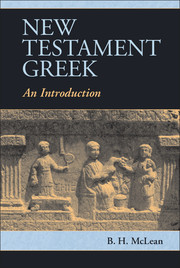Book contents
- Frontmatter
- Contents
- Abbreviations
- Introduction
- 1. Alphabet and Pronunciation
- 2. Writing Greek Letters, Accents, Diacritical Marks, and Punctuation
- 3. Present and Future Active Indicative, Present Active Indicative of the Verb “to be,” and Particles
- 4. Contract Verbs, Present and Future Active Indicative, and Future Indicative of Liquid Verbs
- 5. Second Declension, the Definite Article, and Prepositions
- 6. First Declension and the Definite Article
- 7. Adjectives, Demonstrative Pronouns, and Comparison
- 8. Personal Pronouns, Relative Pronouns, and Reflexive Pronouns
- 9. First Aorist Active Indicative
- 10. Verbal Roots, Principal Parts, and Second Aorist Active Indicative
- 11. Present Middle and Passive Indicative, Future Middle Indicative, and Future Indicative of the Verb “to be”
- 12. Imperfect Active Indicative and Imperfect of the Verb “to be”
- 13. Imperfect Middle and Passive Indicative and First and Second Aorist Middle Indicative
- 14. Third Declension Nouns and Adjectives: Part 1
- 15. Third Declension Nouns and Adjectives: Part 2
- 16. Perfect and Pluperfect Active, Middle, and Passive Indicative
- 17. Aorist Passive and Future Passive Indicative
- 18. Present and Aorist Participles
- 19. Aorist Passive Participle, Perfect Participle, Adverbial Participles, Genitive Absolute, and Periphrastic Constructions
- 20. The Athematic Conjugation (-μι verbs): Part 1 – The Indicative Mood
- 21. The Athematic Conjugation (-μι verbs): Part 2 – δείκνυμι, ϕημί, and Participles
- 22. Subjunctive Mood and Conditional Sentences
- 23. The Infinitive
- 24. Imperative Mood
- Appendix 1. Principal Parts of the Greek Verb
- Appendix 2. Summary of Paradigms
- Summary of Vocabulary to Be Memorized
- Subject Index
- Index of Greek Words Discussed
- Lexicon of Greek Words in Texts for Translation
- References
Introduction
Published online by Cambridge University Press: 05 June 2012
- Frontmatter
- Contents
- Abbreviations
- Introduction
- 1. Alphabet and Pronunciation
- 2. Writing Greek Letters, Accents, Diacritical Marks, and Punctuation
- 3. Present and Future Active Indicative, Present Active Indicative of the Verb “to be,” and Particles
- 4. Contract Verbs, Present and Future Active Indicative, and Future Indicative of Liquid Verbs
- 5. Second Declension, the Definite Article, and Prepositions
- 6. First Declension and the Definite Article
- 7. Adjectives, Demonstrative Pronouns, and Comparison
- 8. Personal Pronouns, Relative Pronouns, and Reflexive Pronouns
- 9. First Aorist Active Indicative
- 10. Verbal Roots, Principal Parts, and Second Aorist Active Indicative
- 11. Present Middle and Passive Indicative, Future Middle Indicative, and Future Indicative of the Verb “to be”
- 12. Imperfect Active Indicative and Imperfect of the Verb “to be”
- 13. Imperfect Middle and Passive Indicative and First and Second Aorist Middle Indicative
- 14. Third Declension Nouns and Adjectives: Part 1
- 15. Third Declension Nouns and Adjectives: Part 2
- 16. Perfect and Pluperfect Active, Middle, and Passive Indicative
- 17. Aorist Passive and Future Passive Indicative
- 18. Present and Aorist Participles
- 19. Aorist Passive Participle, Perfect Participle, Adverbial Participles, Genitive Absolute, and Periphrastic Constructions
- 20. The Athematic Conjugation (-μι verbs): Part 1 – The Indicative Mood
- 21. The Athematic Conjugation (-μι verbs): Part 2 – δείκνυμι, ϕημί, and Participles
- 22. Subjunctive Mood and Conditional Sentences
- 23. The Infinitive
- 24. Imperative Mood
- Appendix 1. Principal Parts of the Greek Verb
- Appendix 2. Summary of Paradigms
- Summary of Vocabulary to Be Memorized
- Subject Index
- Index of Greek Words Discussed
- Lexicon of Greek Words in Texts for Translation
- References
Summary
The great philosophers Plato and Aristotle and the Greek dramatists of Classical Athens wrote in what is now known as Attic Greek (or Classical Greek), which is one of the four major dialects of the antique Greek-speaking world, the others being Ionic, Doric, and Aeolic. However, in the centuries following the Classical period, Ionic Greek came to have a strong influence on the Attic dialect, transforming it into what we now know as Hellenistic Greek.
Hellenistic Greek spread throughout the eastern Mediterranean in the wake of Alexander the Great's conquest of the Persian Empire. The wave of Greek colonization that followed brought with it the Hellenistic Greek language, which quickly became the common language of the region. Hellenistic Greek continued in use throughout the Roman provinces of the eastern Mediterranean during the Roman period. Owing to its widespread usage, Hellenistic Greek was known, even in ancient times, as the koine language or dialect (ἡ κοινὴ διάλϵκτος), meaning the “common” language of the people. This explains why the Hebrew Bible was translated into Hellenistic Greek (the so-called “Septuagint”) in the third and second centuries BC, and why the New Testament was also written in Hellenistic Greek, rather in than another language such as Aramaic or Syriac. In the centuries that followed, the Septuagint became the de facto liturgical text of countless synagogues and early churches. Indeed, as the basis for early Christian liturgy, devotion, and theology, the Septuagint emerged as the most significant body of literature in late antiquity.
- Type
- Chapter
- Information
- New Testament GreekAn Introduction, pp. 1 - 6Publisher: Cambridge University PressPrint publication year: 2011



